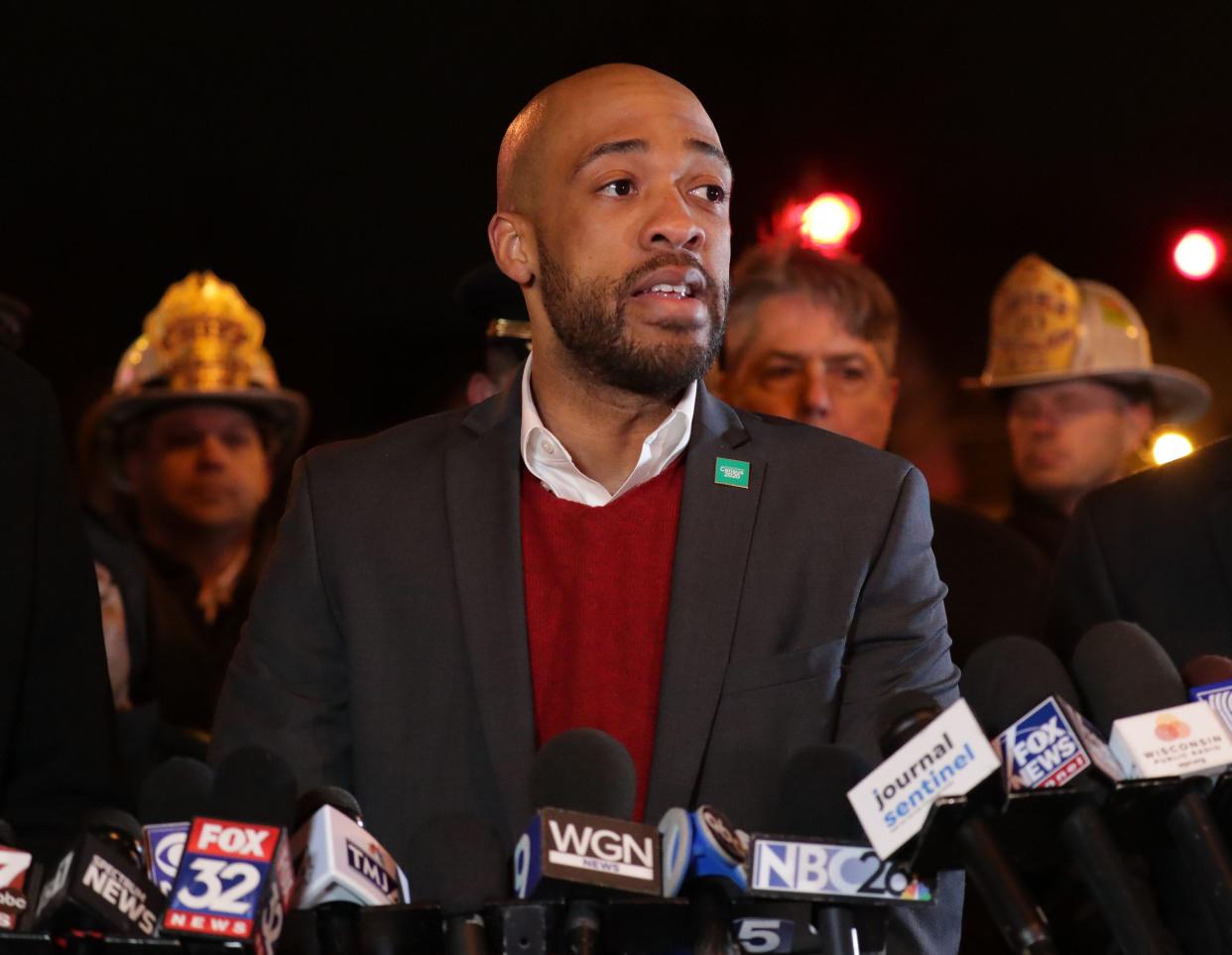Mandela Barnes signals support for a moratorium on large-scale factory farms in Wisconsin
- Oops!Something went wrong.Please try again later.
- Oops!Something went wrong.Please try again later.

MADISON – Democratic U.S. Senate candidate and sitting Lt. Gov. Mandela Barnes says he is open to implementing a moratorium on concentrated animal feeding operations — colloquially known as factory farms — in Wisconsin.
While a moratorium would not ban or eliminate the controversial practice outright, it would place a cap on the number of factory farms allowed in the state and prevent the construction of new CAFOs.
In an interview, Barnes said he believes the practice is unpopular in communities where CAFOs are currently located and said he would be a party to efforts aimed at curtailing the growth of CAFOs in the state.
“People with the DNR need to make sure that wherever large factory farms are being proposed that there is a very real in-depth discussion with the community about what the environmental impact will be,” Barnes said “I haven't met a whole bunch of people who are very happy about them coming into their communities. One idea that’s been proposed is a moratorium on factory farms.
Subscribe to our On Wisconsin Politics newsletter for the week's political news explained.
“I’m more than happy to be a part of that conversation,” said Barnes, who has polled as a narrow front-runner in the Aug. 9 primary for the Democratic nomination for U.S. Senate. Other top contenders in the field are Milwaukee Bucks executive Alex Lasry, state Treasurer Sarah Godlewski and Outagamie County Executive Tom Nelson. The winner will challenge Republican incumbent Ron Johnson in November.
More: U.S. Senate candidate Sarah Godlewski's rural plan pushes for making broadband a public utility
CAFOs, which are often owned or contracted by large corporations, have become a flashpoint for agricultural policy debate statewide given their profitability juxtaposed with their ecological impacts and association with a rash of small farm bankruptcies.
CAFOs are defined by the state Department of Natural Resources as a “feeding operation with 1,000 animal units or more,” but the DNR may designate a farm with fewer than 1,000 animal units as a CAFO if it produces pollutants capable of contaminating a water source.
While CAFOs allow large companies to churn out a high volume of meat and dairy products in a short period of time, their rapid production-based business model has also contributed to plummeting wholesale prices for goods, creating an environment in which small and mid-sized family farms struggle to compete.
In the past year, 48 farms filed for bankruptcy, and Wisconsin led the nation in farm closures between 2020 and 2021.
Dairyland in Distress: A Journal Sentinel special report
Supporters of the industry say a large economy of scale is a necessity in today's agricultural economy and that large-scale farms provide more affordable meat options to help feed a larger number of people.
Pushing for a limit on factory farms is now gaining momentum as a national Democratic party agenda item. Last year Sen. Cory Booker, D- N.J., who endorsed Barnes’ Senate campaign in January and is scheduled to campaign for him in Milwaukee on Friday, introduced the Farm System Reform Act of 2021, which explicitly calls for a CAFO moratorium.
Barnes has been critical of the factory farm industry, stressing a need to “crack down on Big Ag monopolies.”
Aside from the economic damage to rural communities wrought by factory farm competition, the potentially detrimental health impacts of CAFOs are most directly felt by nearby residents.
Kewaunee County, for instance, is home to more than a dozen industrial-scale farms and residents have discovered nitrates in wells and drinking water as a consequence of manure leakage from nearby CAFOs.
Factory farms have also been tied to an increase in greenhouse gas emissions such as carbon dioxide and methane. According to Gov. Tony Evers’ Clean Energy Plan, agriculture is among the only business sectors in Wisconsin that experienced a spike in carbon dioxide emissions between 2005 and 2018. Agricultural emissions grew 21.3% during the measured time period.
The spike in carbon dioxide emissions coincides with steady growth in the number of CAFOs in the state during the same time period.
Barnes rejected laying blame for spikes in carbon dioxide emissions on farmers as a whole, citing the high volume of organic farms in Wisconsin and “federal programs” designed to assist family farmers with implementing ways to capture carbon in the soil."
“It’s not the cow, it’s the how,” Barnes said “We need to regulate large corporate monopoly farms. We need to be responsible in the way that we farm in this state, and family farmers all across Wisconsin, they’re trying to do the right thing, but the bad actors aren’t always being held accountable.”
Our subscribers make this reporting possible. Please consider supporting local journalism by subscribing to the Journal Sentinel at jsonline.com/deal.
DOWNLOAD THE APP: Get the latest news, sports and more
This article originally appeared on Milwaukee Journal Sentinel: Mandela Barnes signals support for CAFO moratorium in Wisconsin

